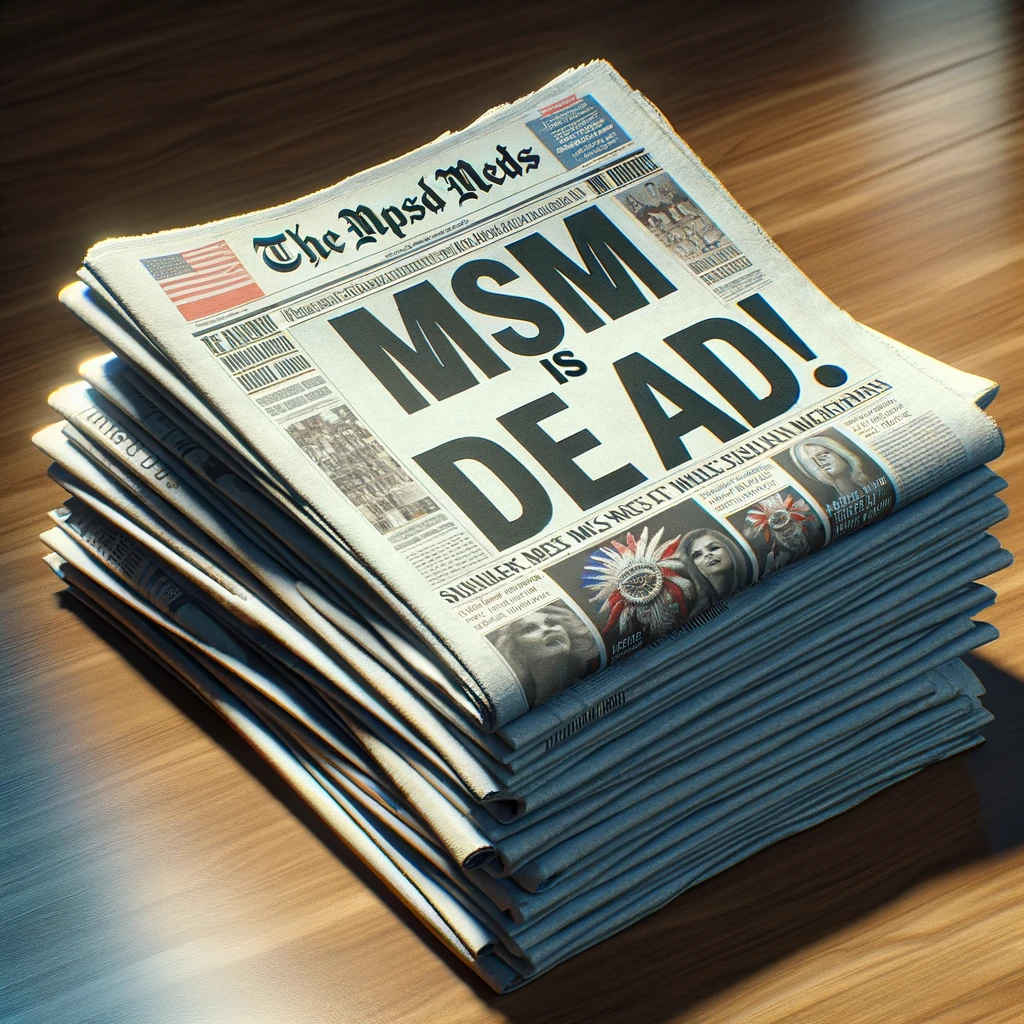
The media is in crisis, as New Zealand audiences flee from traditional sources of news and information.
The latest survey results on the public’s attitude to the media shows plummeting trust. And New Zealand now leads the world in terms of those who want to “avoid the news”. But who or what is to blame for this striking and alarming trend?
The Shocking survey results about plummeting public trust in the media
Yesterday the annual report on Trust in news in Aotearoa New Zealand 2024 was released, containing statistics that the authors describe as “shocking”, and which others say should be a “massive wake up call” for media. The report has been produced by the Centre for Journalism Media and Democracy (JMAD) at Auckland University of Technology (AUT). It’s produced in collaboration with the Reuters Institute for the Study of Journalism.
The main finding is that public trust in the media continues to plummet down: ‘In 2020, 53 per cent of New Zealanders said they trusted the news in general. In 2024, that figure was at 33 per cent. In five years, general trust in the news has fallen [20 percentage points].” One of the study’s co-authors, Merja Myllylahti, says she was “shocked” by the results.
The chart below shows the decline of trust in the media:
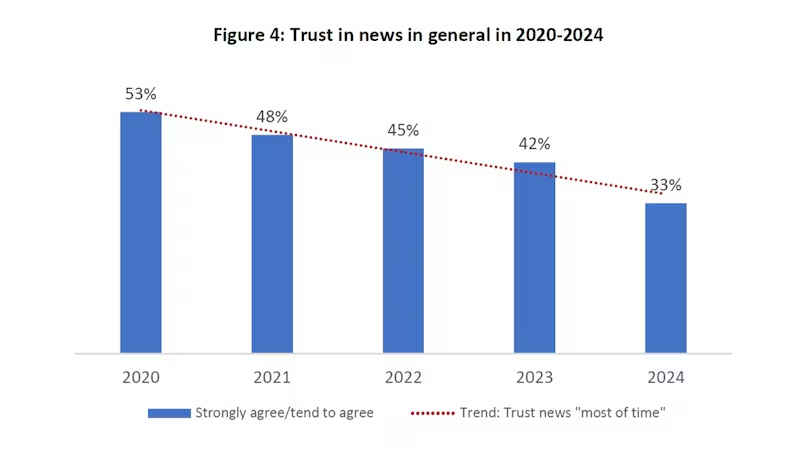 Generally, trust in the media has been declining all over the world. But in New Zealand that decline is much steeper than elsewhere. According to the authors of the report, the overall trust levels have dropped by 38 per cent in the five years the AUT study has been carried out.
Generally, trust in the media has been declining all over the world. But in New Zealand that decline is much steeper than elsewhere. According to the authors of the report, the overall trust levels have dropped by 38 per cent in the five years the AUT study has been carried out.
For the first time, New Zealand’s trust score is lower than the global average of 40 per cent, recorded by Reuters Institute’s Digital News Report. And it’s now like that of the US (32 per cent) and the UK (33 per cent).
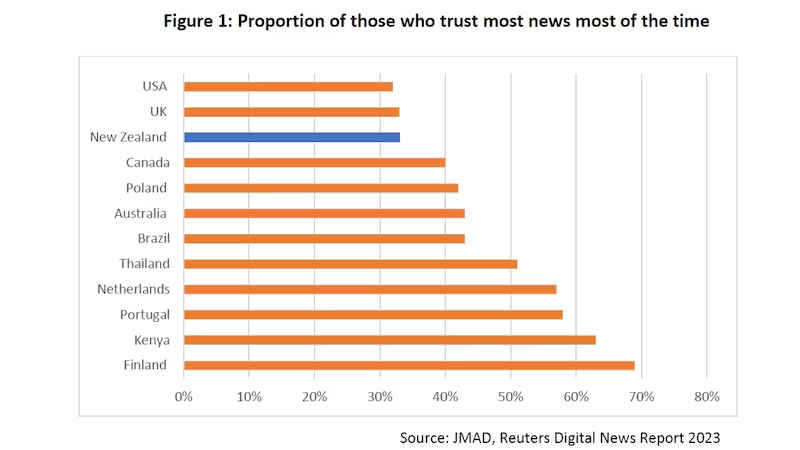 The survey also asked the public to rate the trustworthiness of the 16 main new media, and none of them managed to score more than an average of 5 out of 10. The percentages of people trusting individual broadcasters has fallen particular heavily: RNZ fell 7.5 per cent, Newshub 7.8 per cent, TVNZ 9.4 per cent, and Whakaata Māori TV 14.6 per cent.
The survey also asked the public to rate the trustworthiness of the 16 main new media, and none of them managed to score more than an average of 5 out of 10. The percentages of people trusting individual broadcasters has fallen particular heavily: RNZ fell 7.5 per cent, Newshub 7.8 per cent, TVNZ 9.4 per cent, and Whakaata Māori TV 14.6 per cent.
Perhaps even more alarming is the proportion of New Zealanders who say that they now avoid the news. Last year, the survey registered that 69 per cent say they actively avoid the news – making New Zealand the world leaders in this trend. This year it’s got worse – now 75 per cent say they avoid the news. The international average is only 40 per cent, and the next more media-avoidant country is Greece on 58 per cent.
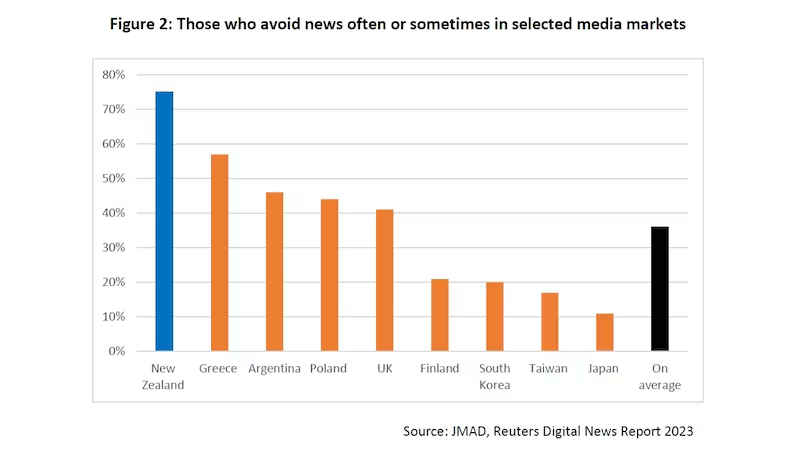
New Zealand’s world-leading avoidance is made worse by the fact that New Zealanders are actually still very interested in the news and information – over 70 per cent said there were interested in news to some degree.
All of these trends are reiterated by another survey on public perceptions of the media, carried out in March by polling firm Rangahau Aotearoa Research New Zealand. You can the report here: In news we trust
Here’s their summary of the research findings: “Almost two-thirds of respondents (62%) stated they were personally concerned about ‘the falling trust in the news in general’. More specifically, 78% said they were concerned about the ‘spread of fake news and information’, while 64% said they were concerned about the quality of the news (which we defined as ‘in-depth analysis and the news being dumbed down’).”
You can see more answers to the questions in the chart below, including that 55 per cent of respondents are concerned about “freedom of the press” – defined as concerns about “the news not being censored”.

Late last year, the Global IPSOS polling company also asked New Zealanders about the professions that they trust. Unsurprisingly, the highest proportion of New Zealanders said that they trusted doctors (65%) and teachers (61%), and only 21% said they trusted journalists. But the least trusted professions were politicians (17%) and “Advertisement executives” (14%) – see Trent Doyle’s Newshub report, The most trustworthy professions in New Zealand and other countries.
Who or what is to blame for New Zealand distrusting the media?
The main AUT report on media trust provides some details of what the public say is their problem with the New Zealand media: “Those who say they don’t trust and/or avoid the news are most concerned about the negativity of news, including its impact on their mental health, and what they perceive as political bias and opinion masquerading as news.”
This is covered very well by RNZ’s Colin Peacock: “The report asked New Zealanders whether they believed that the news media ‘were independent of undue political or government influence most of the time’. Twenty-seven percent agreed, but the proportion of those who ‘strongly or tend to disagree’ increased from 43 percent in 2023 to 47 percent. A quarter of respondents neither agreed nor disagreed. Eighty-seven percent of those surveyed who did not trust news said it was ‘biased and unbalanced”, while 82 percent said news reflected the political leaning of the newsroom and 76 percent regarded news as “too opinionated, lacking in actual information’.” – see: People’s trust in news has tumbled over the past year, survey shows.
The criticisms of the Public Interest Journalism Fund are also obviously resonating with the public. The $55m fund, was established by the last government, and continues to fund a number of media projects, was contentious with critics because it aligned with the Labour Government’s Te Tiriti agenda of change – it required all applicants to show a “commitment to Te Tiriti o Waitangi and to Māori as a Te Tiriti partner” — alongside a commitment to te reo Māori.
Hence, some believed that this compromised the media outlets, encouraging them to report more sympathetically towards Treaty and co-governance issues. And the AUT study shows that 59 per cent of the public appear to accept these sorts of critiques of the media, agreeing the statement that “government financial support for the media means you cannot trust journalists to hold the government to account”. Although the number was slightly down on last year’s 61 per cent, arguably it shows the impact of the Public Interest Journalism Fund controversy.
Is “media bias” to blame?
The AUT survey suggests that the public blame the media for becoming less trustworthy. According to the report, “Those who say they don’t trust and/or avoid the news are most concerned about the negativity of news, including its impact on their mental health, and what they perceive as political bias and opinion masquerading as news.”
Respondents who did not trust the media were asked what factors had reduced their trust:
- 87 per cent believed the news was “biased and unbalanced”
- 82 per cent believed news reflected the political leaning of the newsroom
- 76 per cent regarded news as “too opinionated, lacking in actual information”.
In terms of bias, there’s some interesting evidence about the self-declared ideological leanings of journalists in Massey University’s Worlds of Journalism survey in 2022. It found that about two-thirds (65 per cent) of journalists identify as being leftwing, 23 per cent call themselves centrists, and 12 per cent say that are rightwing – see: Worlds of Journalism Study 2.0. Journalists in Aotearoa/ New Zealand.
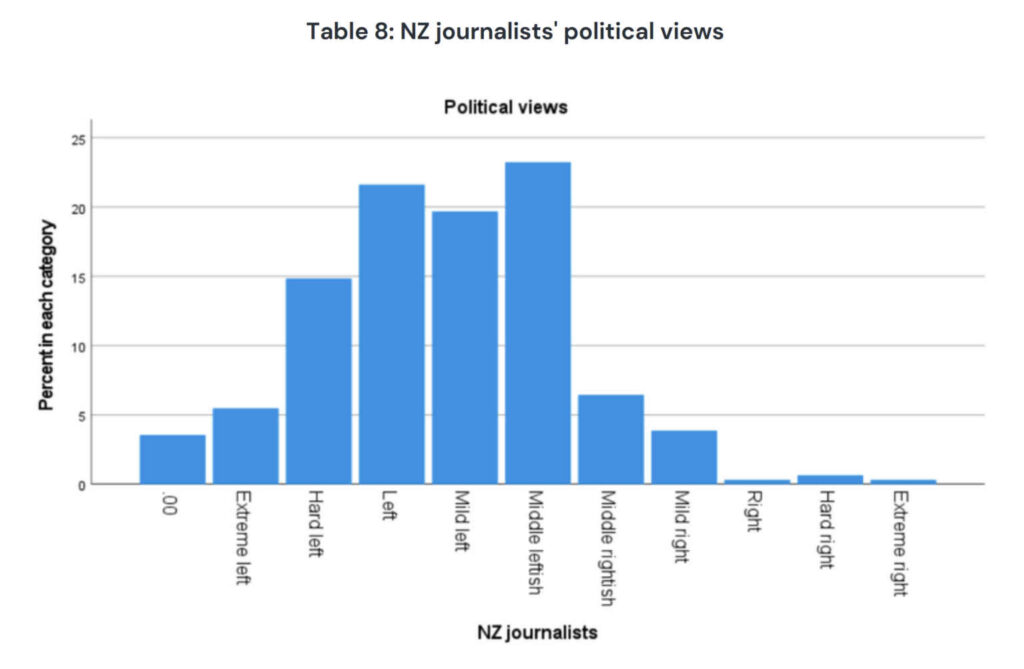
Some of this is bias is also evident in a Curia Research survey carried out in December, which asked the question: “Do you think the New Zealand media overall are biased towards the right, biased towards the left or not biased?” – see: NZ media bias (paywalled).
The overall results were interesting: 37 per cent said the media was “Biased towards left” and 12 per cent said the media was “Biased towards right”, with another 31 per cent saying there was no bias, and 12 per cent not sure.
Similarly, the same research company asked the public to identify where on the left-right political spectrum each of the main media outlets were in April last year. The results suggested that the NZ Herald was the most politically balanced media outlet, with very similar left and right scores – see: NZ Herald rated as NZ’s most politically balanced media outlet.
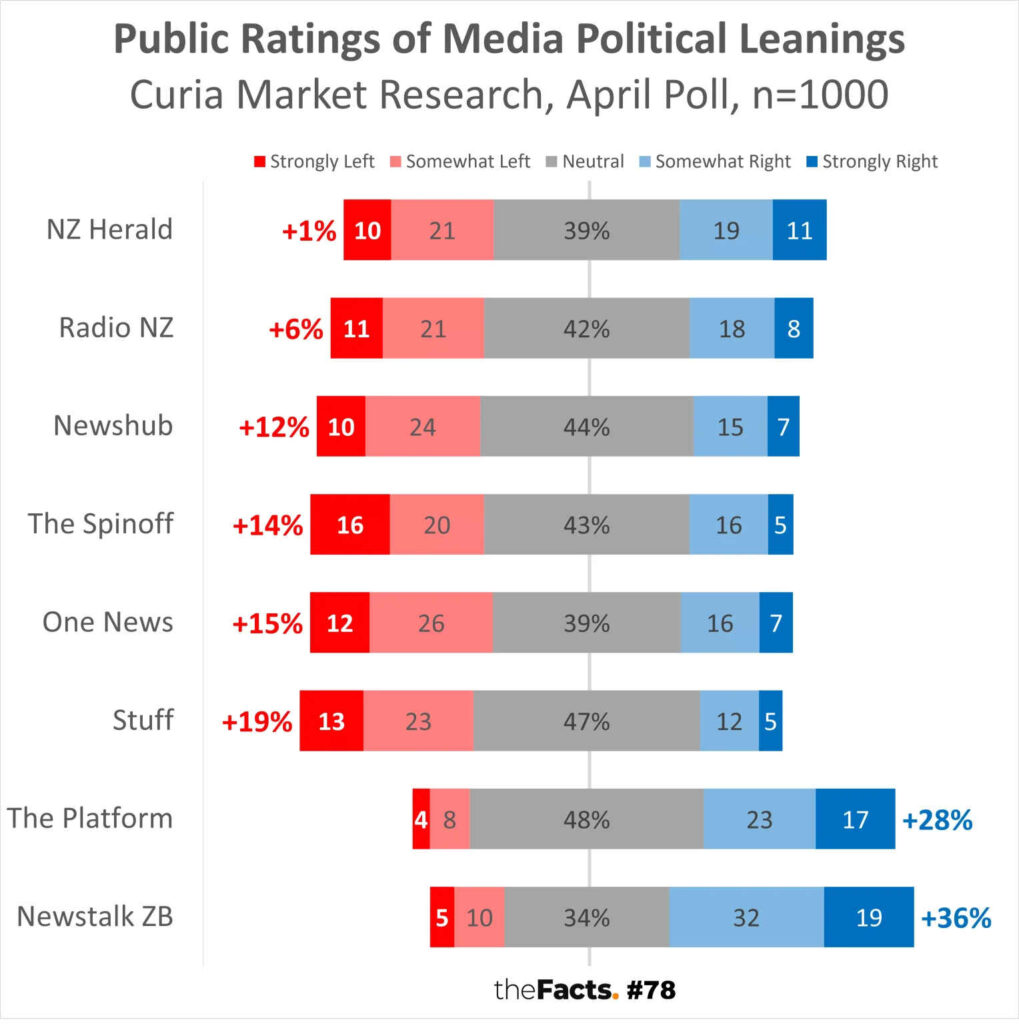
The alleged bias of the media was discussed yesterday by Newstalk ZB broadcaster Heather du Plessis-Allan, who says “we are seeing [the bias] play out right now, with this new Government being given absolutely no honeymoon whatsoever because their conservative, liberal and centre-right ideas are an anathema to left-leaning journalists, who rail against it every single day” – see: The media’s been given a wake-up call about bias.
Media academic, and former editor of the NZ Herald, Gavin Ellis, has also written about yesterday’s media trust report, saying that the results “should shock the media sector”, and “Surely to God that sends a message to all mainstream, media that their approach to journalism has to change” – see: NZ media’s lab test results spell bad news.
Ellis ponders whether, rather than bias, it’s the media’s overwhelming negativity that is the problem: “I went back and reviewed the front page lead stories of our metropolitan papers published last year and found that, with only irregular glimmers of hope, they were unremittingly negative. A third of the New Zealand Herald’s lead stories in that period were crime related… Unrelenting gloom is something we shy away from. And, if we see media painting an exaggerated picture that does not reflect our own reality, our trust in them is also likely to diminish.”
He also points to the fact that the Otago Daily Times has the highest trust rating in the survey, which Ellis says is significant because that newspaper “takes a more traditional or measured approach to selection and presentation” of news.
But will those in the media accept their faults, or just blame others?
Last year I talked to a head of one of the top media outlets in the country, during which I asked about the public’s perception of bias at the company, and whether they thought it was a problem that their media company was perceived in a certain way. I was surprised to hear that this was news to them – they said that they had never received such feedback. They weren’t denying that this might be a problem, just that they had never been told this before.
Sometimes institutions and those in them suffer from living in the bubble, and can get out of sync with the public mood.
Similarly, Heather du Plessis Allan says that she thinks that journalists and broadcasters will simply reject the survey and the notion that the media has a trust problem: “I genuinely think newsrooms up and down this country don’t believe this is true. That is my experience of talking to editors in various media. They don’t see it, or they do and they make excuses.”
Blaming social media, politicians, and the public
In reporting on the survey yesterday, BusinessDesk journalist Daniel Dunkley interviewed Merja Myllylahti about the AUT report, and she pointed to the impact of politicians like Winston Peters who critique media bias, saying that “political attacks against the media will also have contributed to the decline” in trust – see: Trust in NZ news declines sharply: AUT (paywalled).
Myllylahti also points to some other regular factors often blamed by the media: “The drop since 2020 has followed Covid, misinformation campaigns around vaccines, and the recent election.”
Elsewhere, Myllylahti has suggested the problem of declining trust arises from narratives that the media has become “corrupt” and “woke”. She argues that the problem is that people have weaponised terms such as “mainstream media”, and therefore we need to find new words to use about journalism – see: To build trust in media, words matter.
Today’s editorial in the Herald also points the finger at misinformation, social media, and the public’s apparent lack of media literacy – see: Misinformation and rise of AI highlight urgent need to increase media literacy rates (paywalled).
Following on from the AUT report, the newspaper warns that things might now get worse: “With big world events like the US election just months away, we’re likely to see a flood of disinformation hitting social media and further eroding people’s trust in news media. Artificial intelligence (AI) tools, which, sure, can be used for good things, could also become a powerful weapon in spreading disinformation.”
Similarly, the Otago Daily Times editor Paul McIntyre has reflected on the AUT report, saying that social media and misinformation are a big problem: “Do we really want a world where social media is the only place where people get their news? There is an increasing amount of misinformation on social media, in addition to information tailored to people’s searches, which then doesn’t allow for opposing opinions to be read or listened to. Democracy will be the loser if this continues to grow” – see: ODT deemed most trustworthy news brand in NZ.
How can the public’s trust in media be restored?
The maxim that trust is hard-earned, easily lost, and difficult to re-establish applies strongly to the media and its audience in New Zealand. There are no easy answers to fixing what is a serious and difficult problem.
Newstalk’s Heather du Plessis Allan dealt with this issue in her column on public trust in the media, saying: “Now the real question is, can the media turn this around? And I’m going to make a prediction – no.”
She’s probably correct to be pessimistic. But given the importance of media to democracy, there needs to be more effort given to the problem.
Much of the answer will depend on what people think the original problem is caused by. For those who point the finger at the public themselves for being media illiterate, the answer will just be “more education”. Hence today’s Herald editorial on the matter says we need programmes in primary schools to teach media literacy.
Others will point to the relationship between media and their audiences having become strained. One of the AUT report authors, Greg Treadwell emphasises this, saying: “Trust in news and news outlets keeps declining and journalists and media companies need urgently to form relationships with their audiences and with communities to rebuild that trust.”
The best place to start for the media might be to realise that there is actually a problem, and that it’s not enough to just blame this on others – such as social media, disinformation, politicians, or the public’s lack of media literacy. Real soul-searching should mean the media reflects on how it has allowed itself to be perceived as distant, elitist, and conformist.
Dr Bryce Edwards is Political Analyst in Residence, Director of the Democracy Project, School of Government, Victoria University of Wellington.
Great points in your last paragraph there Bryce, but don’t hold your breath. Those people are incapable of self reflection or accountability.
“Bias? What Bias? We’re only 30% biased, it must just be because the stories we report are super negative…”
Yes, because prior to 2016 they only ever reported sunshine and rainbows hey? 😒
And keep in mind this is a study done by fellow lefties, so the stats they give out are very likely “massaged” (lol’d at pro-jab Newstalk ZB being regarded as “right wing”).
The minions all cry out that the internet is fake and that THEY’RE the truth tellers, when in reality it’s precisely the OPPOSITE. The internet is raw, unfiltered truth being delivered to our eyeballs by citizen journalists, accredited scientists and fellow human beings in real-time, while THEIR offerings are always a day late, watered-down and spun/manipulated to serve whatever angle they’re trying to push that day. Yes, there’s a lot of fake garbage online too, but people are smart enough to figure it out themselves. There’s actually a strong tendency online for people to fact check one another almost immediately (eg Twitter community notes) and to call out fake news, which makes the Dino media’s insistence that no one trust the internet even more absurd. And please let’s not start pointing out absolute dog turds like “weapons of mass destruction”, “deadliest pandemic in history” and “safe and effective” which the legacy media OWN 100%. They’ve pumped out FAR more lies with FAR greater consequences on the human race than anything anyone’s ever found online.
The real reason they’re imploding, beyond anything else, is that they simply have nothing to offer us anymore. We don’t want what they’re peddling. We have X, we have Rumble, we have sun stack, we have independent news sites like this one we’re on right now, all giving us the news we actually want and not afraid to let us voice our opinions. The establishment and their mockingbirds can screech about “misinformation” and “hate” all they want, they can ban and censor the entire internet for all I care, NOTHING is going to ever make me unknow what I know 🤷🏼♂️
Just go away already.
Bravo well said 👏👏👏
Beautifully put. My thoughts exactly!
The last paragraph is making a start with identifying the problem. I would add to distant, elitist and conformist also the words meek, lacking credibility, depth, tenacity, nuance and shying from big uncomfortable topics. “Lacking journalism” sums it up actually.
Left vs right. Tsk. Once as a media you’re a mouthpiece of the global totalitarian WEF agenda left or right loses all meaning.
A couple of years ago, a journalist I held in high regard put their name to two MSM articles which fell way below the standard of journalism I know they are capable of. Way below….with one of the articles actively attempting to smear the reputation of a female lawyer/activist. The other piece made a series of statements that were easily disproved by a superficial search of academic publications.
I had had a couple of phone conversations and exchanged emails with this journalist in the past, so I felt comfortable reaching out via email to express my disappointment that the dreadful decline in journalistic standards had so badly affected their work. I gave praise for their previous excellent work, along with forthright criticism of the recent two articles. This was deemed to be “abuse”.
Enough said.
Morons remain in denial but continue to arrogantly seek to influence us while in their denial
The obvious reason for any loss in trust is that you’ve been caught consistently lying too often without any hint of any intention to report accurately.
And instead of analysing objectively, these morons continue to frame the question in terms of left vs right. Why don’t they discover their brain cells (if they exist) and explore a more complete range of paradigms?
It’s called science. Discover it.
Regarding the question:
WHAT’S TO BLAME FOR THE PUBLIC’S PLUMMETING TRUST IN THE MEDIA?
Answer. They’re a bunch of dimwitted perverted lying evil woke communist gaslighting ars*holes.
Hope that helps 🙂
Perhaps blatant corruption, groupthink, WEF indoctrination and extremist woke marxist ideology might have something to do with it.
Just an obvious observation.
A carefully considered short answer:
Indoctrinated woke morons.
They woked too close to the sun ☀️
Nothing alarming about this, its the first positive I’ve heard in a very long while. People are waking up to what is for the most part propaganda, paid for with our money by the political establishment, to entrench their perspectives and ensure support. This is an open rejection not only of MSM propaganda but also the political elites and its not before time.
We need a total revision of govt and its systems in this country. The current one is unaccountable, arrogant and to be generous, at the very least, not serving the interests of the majority of New Zealanders. Dirty trade deals, the COVID tyranny, now cosying up to AUKUS and warmongering NATO.
How bad does it need to get for people to see? Clearly the limit has been reached and people have had “enough”. GOOD.
Alternate media has filled the void left by the fake news peddled by the MSM, telling truth to lies, Long may it continue because if the MSM are allowed to re-establish their stranglehold on the the narrative, I personally feel we have no future.
It’s just that for the past, ohl I don’t know, 5 years…all we’ve been a witness to is the sycophantic news media adoring our previous government and it’s leader.
This statement below is absolutely made up B.S. and sounds like deflection to me.
“Merja Myllylahti …..pointed to the impact of politicians like Winston Peters who critique media bias, saying that “political attacks against the media will also have contributed to the decline” Winstone only pointing out what people have already been saying.
And…..this.
“we need programmes in primary schools to teach media literacy”. NO! I don’t think we need more propaganda taught to the young and impressionable. They need to learn critical thinking skills all the way through their education!
Already told our one the MSM are, for the most part liars and not to be trusted, alongside politicians and govt in this country. Parental input in this age or tyranny and corruption, is essential.
My friends used to think i was crazy because i used to shout at the tv and told them jac#nta was a succubus.
They don’t think im crazy anymore.
We can all see that the corporate media has degenerated into a globalist psyop owned by those who only seek profit from the deception they foister.
The nz media has proven to be complicit in this act of democide.
Complicit in pre meditated mass murder. A key player in fact.
Let all their names be collected in a register of the complicit to face justice for their unparalleled historic crime against us all.
Foul agents of deception.
Yes we can consider this a small win but sadly everywhere you turn puppets of all kinds are pushing the globalist propaganda be it that coffee shop downstairs that wont accept cash, or companies that would rather get a high ESG score than care about their Employees health and safety.
The more we do everyday stuff on line the more they win. What we need to be doing as often as possible is use Cash, put down your cellphone tracker device (it really is spying on you), Instead of streaming that movie you really love own it on physical media, physical media will never go out of fashion. We need to use technology to benefit us not some weird global elite that don’t care if they kill a billion people as long as they get what they want.
Maybe if Sunday had reported about masks being useless at protecting anyone from airborne virus, that NZ’s response was detrimental to most of its citizens, the massive amount of injuries from the covid jabs, the virus being man made, and the rise of excess deaths in highly jabbed countries, maybe, just maybe they would not be out of a job, because people had stopped watching and in turn advertising had dried up.
And still, they keep mum on these things. You reap what you sow. Aim your anger somewhere else Patrick. Gower on denial
Clif High has a very valid warning to all media propagandists.
As they turn to defend WEF agenda they only expose their obedience and alignment to this utterly evil, murderous cult.
Spouting their owners filth.
Utter treason against our peoples.
A coordinated offensive.
Truly vile.
Truly guilty.
https://open.substack.com/pub/clifhigh/p/propagandists-shuffle-danz?utm_source=share&utm_medium=android&r=2f9m40
NZ mainstream media accepted $55M of our hard earned tax money to convince kiwi’s that a virus was hunting us down, that it was dangerous to go out, be social, talk to our neighbours. MSM waffled on about 6feet distancing to be safe from said virus that is out hunting us down. Inflated COVID death figures, under reported vaccine harms and deaths. No other treatments for COVID, ivermectin is for horses, no mention of Nobel prizes there. Consequently get vaccinated to save Grandma, get vaccinated, get vaccinated, get vaccinated, it’s safe and effective. Provisional approval means safe and effective, tells us the vaccine stops transmission by 95%, myocarditis is mild. Sudden deaths baffle doctors. I could go on. Now MSM are baffled by the ratings. I’ll clarify, lies and propaganda that result in harm and death are not how you gain popularity guys, wake up. Military tribunals would be the answer.
Gee I enjoyed reading the comments!! ❤️